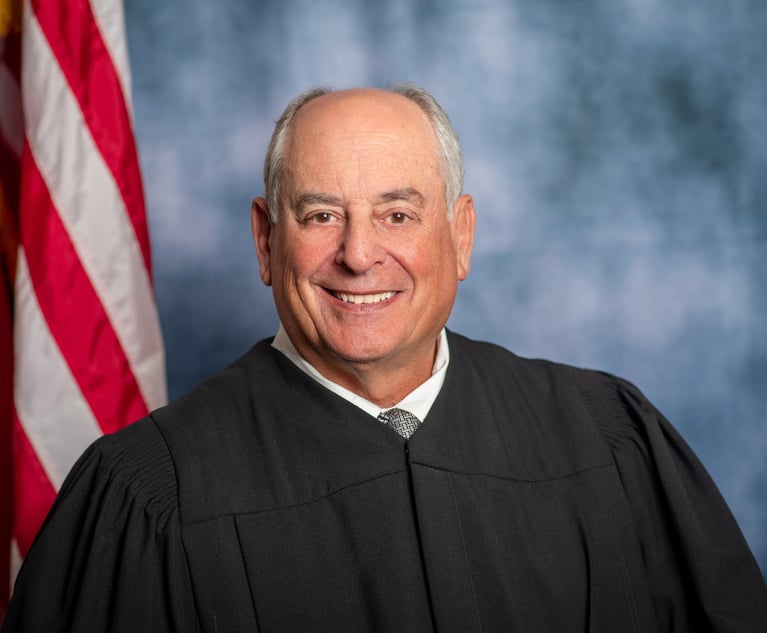 Josh McLaurin, litigation associate, Krevolin & Horst. (Courtesy photo)
Josh McLaurin, litigation associate, Krevolin & Horst. (Courtesy photo)State Election Board Dismisses Complaint Against Democratic Lawmaker
Josh McLaurin, an attorney at Atlanta's Krevolin & Horst, said that administrative complaints challenging his qualifications for office served as a basis for incendiary political mailers.
August 22, 2019 at 05:07 PM
5 minute read
A Republican Party lawyer's complaint against an attorney, who sued the GOP for libel and flipped a long-held state House Republican seat, has been dismissed by the state elections board.
The administrative complaint—one of three filed by GOP deputy counsel Vincent Russo against Atlanta attorney Josh McLaurin last year—served as the basis for incendiary political mailers circulated by the Republican Party in the run-up to the 2018 election.
McLaurin, a Sandy Springs Democrat, is a litigation associate with Atlanta's Krevolin & Horst.
The mailers claimed McLaurin was the subject of multiple criminal investigations involving alleged "false swearing" and illegally accessing the state's online voter registration system, even though an administrative law judge determined McLaurin was legally qualified to run.
The board threw out Russo's complaint on the recommendation of its investigator, said McLaurin attorney Scott Holcomb, a state representative and a partner at Atlanta's Holcomb+Ward.
Russo complained that McLaurin lied on his candidate qualification papers about how long he had lived in Georgia so he could run for public office.
 Scott Holcomb, Holcomb+ Ward, Atlanta. (Photo: John Disney/ALM)
Scott Holcomb, Holcomb+ Ward, Atlanta. (Photo: John Disney/ALM)
"It was character assassination through the legal process," Holcomb said of the dismissed complaint.
"The law and the facts are very clear that Mr. McLaurin was qualified" to run, Holcomb said. "He satisfied both the constitutional and statutory requirements for residency."
The dismissal of Russo's complaint marks the third victory for McLaurin over multiple efforts by the state GOP to tarnish and disqualify him as a candidate for the open seat long held by Republican lawyer Wendell Willard. Willard, Sandy Springs' city attorney, was the longtime chairman of the state House Judiciary Committee when he retired last year.
Russo—a partner with The Robbins Firm in Atlanta who also served as counsel to Gov. Brian Kemp's gubernatorial campaign—filed the administrative complaint three days after the secretary of state signed off on a decision by a state administrative law judge to toss out a nearly identical challenge to McLaurin's candidacy. Russo also filed that initial complaint.
Russo also filed a third administrative complaint that is still pending. Russo said he filed the second and third complaints on his own behalf, not for the state GOP.
Russo filed the first complaint challenging McLaurin's Georgia residency for Gabriel Sterling, a longtime Sandy Springs Republican who now serves as Secretary of State Brad Raffensperger's chief operating officer. Russo's co-counsel was David Dove, Kemp's legal counsel and chief of staff when Kemp was secretary of state. Dove became Kemp's executive counsel after he became governor.
McLaurin's Republican opponent, Sandy Springs attorney Alex Kaufman, had no direct link to the administrative complaints against his opponent, but the GOP mailers were clearly intended to benefit his campaign.
Holcomb has twice argued successfully that state law requires candidates to have lived in the state for two years by Election Day, not by the date they qualify to run for office.
But Russo contended that McLaurin must have lived in Georgia for two years when he qualified to run. Russo said he filed the follow-up complaint personally, not on behalf of the GOP.
In addition to beating back Russo's administrative complaints, McLaurin also secured a settlement agreement last November from the state GOP that it would stop funding or assisting in the creation and distribution of the incendiary mailers. The settlement was reached after McLaurin sued the GOP for libel.
"I'm obviously pleased," McLaurin said Thursday. "But I want people to recognize that there are lawyers out there who are using election law as a weapon."
"In a fake news era when distrust is at an all-time high, I think we need to be especially wary of members of the bar who choose to engage in allegations like this and ask ourselves whether this is the way we want politics to be conducted in our state," he added.
Russo said he wasn't at Wednesday's hearing, because he wasn't notified the board intended to address his complaint.
"I think we can all agree that the [candidate] qualifying form could be clearer to avoid this type of issue in the future," he said.
Holcomb agreed that some clarifying language on the qualification forms may be warranted. But, he added, "Although it seemed like there was some lack of clarity as to which election triggers the statue and the constitutional [residence] requirement, in my mind there was none at all. Josh's interpretation of the document was right. … How long he had spent in Georgia as of the date of the [qualifying] affidavit is not relevant. It's with respect to the date of the election."
Further Reading:
This content has been archived. It is available through our partners, LexisNexis® and Bloomberg Law.
To view this content, please continue to their sites.
Not a Lexis Subscriber?
Subscribe Now
Not a Bloomberg Law Subscriber?
Subscribe Now
NOT FOR REPRINT
© 2024 ALM Global, LLC, All Rights Reserved. Request academic re-use from www.copyright.com. All other uses, submit a request to [email protected]. For more information visit Asset & Logo Licensing.
You Might Like
View All
Georgia Supreme Court Honoring Troutman Pepper Partner, Former Chief Justice
2 minute read
'A 58-Year-Old Engine That Needs an Overhaul': Judge Wants Traffic Law Amended
3 minute read
Appeals Court Removes Fulton DA From Georgia Election Case Against Trump, Others
6 minute read
Family of 'Cop City' Activist Killed by Ga. Troopers Files Federal Lawsuit
5 minute readTrending Stories
- 1It's Time To Limit Non-Competes
- 2Jimmy Carter’s 1974 Law Day Speech: A Call for Lawyers to Do the Public Good
- 3Second Circuit Upholds $5M Judgment Against Trump in E. Jean Carroll Case
- 4Clifford Chance Hikes Partner Pay as UK Firms Fight to Stay Competitive on Compensation
- 5Judicial Conduct Watchdog Opposes Supreme Court Justice's Bid to Withdraw Appeal of Her Removal
Who Got The Work
Michael G. Bongiorno, Andrew Scott Dulberg and Elizabeth E. Driscoll from Wilmer Cutler Pickering Hale and Dorr have stepped in to represent Symbotic Inc., an A.I.-enabled technology platform that focuses on increasing supply chain efficiency, and other defendants in a pending shareholder derivative lawsuit. The case, filed Oct. 2 in Massachusetts District Court by the Brown Law Firm on behalf of Stephen Austen, accuses certain officers and directors of misleading investors in regard to Symbotic's potential for margin growth by failing to disclose that the company was not equipped to timely deploy its systems or manage expenses through project delays. The case, assigned to U.S. District Judge Nathaniel M. Gorton, is 1:24-cv-12522, Austen v. Cohen et al.
Who Got The Work
Edmund Polubinski and Marie Killmond of Davis Polk & Wardwell have entered appearances for data platform software development company MongoDB and other defendants in a pending shareholder derivative lawsuit. The action, filed Oct. 7 in New York Southern District Court by the Brown Law Firm, accuses the company's directors and/or officers of falsely expressing confidence in the company’s restructuring of its sales incentive plan and downplaying the severity of decreases in its upfront commitments. The case is 1:24-cv-07594, Roy v. Ittycheria et al.
Who Got The Work
Amy O. Bruchs and Kurt F. Ellison of Michael Best & Friedrich have entered appearances for Epic Systems Corp. in a pending employment discrimination lawsuit. The suit was filed Sept. 7 in Wisconsin Western District Court by Levine Eisberner LLC and Siri & Glimstad on behalf of a project manager who claims that he was wrongfully terminated after applying for a religious exemption to the defendant's COVID-19 vaccine mandate. The case, assigned to U.S. Magistrate Judge Anita Marie Boor, is 3:24-cv-00630, Secker, Nathan v. Epic Systems Corporation.
Who Got The Work
David X. Sullivan, Thomas J. Finn and Gregory A. Hall from McCarter & English have entered appearances for Sunrun Installation Services in a pending civil rights lawsuit. The complaint was filed Sept. 4 in Connecticut District Court by attorney Robert M. Berke on behalf of former employee George Edward Steins, who was arrested and charged with employing an unregistered home improvement salesperson. The complaint alleges that had Sunrun informed the Connecticut Department of Consumer Protection that the plaintiff's employment had ended in 2017 and that he no longer held Sunrun's home improvement contractor license, he would not have been hit with charges, which were dismissed in May 2024. The case, assigned to U.S. District Judge Jeffrey A. Meyer, is 3:24-cv-01423, Steins v. Sunrun, Inc. et al.
Who Got The Work
Greenberg Traurig shareholder Joshua L. Raskin has entered an appearance for boohoo.com UK Ltd. in a pending patent infringement lawsuit. The suit, filed Sept. 3 in Texas Eastern District Court by Rozier Hardt McDonough on behalf of Alto Dynamics, asserts five patents related to an online shopping platform. The case, assigned to U.S. District Judge Rodney Gilstrap, is 2:24-cv-00719, Alto Dynamics, LLC v. boohoo.com UK Limited.
Featured Firms
Law Offices of Gary Martin Hays & Associates, P.C.
(470) 294-1674
Law Offices of Mark E. Salomone
(857) 444-6468
Smith & Hassler
(713) 739-1250






